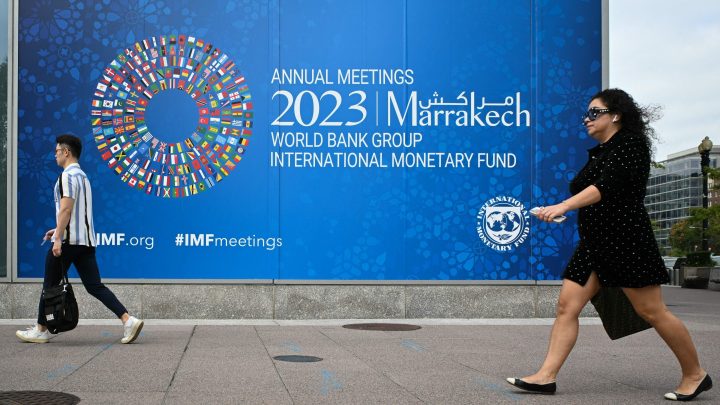
U.S. economy among the few bright spots at World Bank/IMF annual meeting
U.S. economy among the few bright spots at World Bank/IMF annual meeting

The 2023 fall meetings of the World Bank Group and the International Monetary Fund are underway this week. On Tuesday, the IMF released its latest World Economic Outlook, which left its prediction for global growth unchanged for the year at 3%.
The IMF did lift its forecast for U.S. economy, however. The U.S. has been a rare economic bright spot this year, with steady economic growth even as other countries struggle.
The World Bank/IMF meetings are being held in Marrakech, Morocco, a region struggling to recover from a severe earthquake that killed thousands of people just a month ago. The contrast with the U.S. could not be more stark. The IMF says the U.S. is the only major economy where output has returned to pre-pandemic levels.
“Right now, it does seem like we’ve seen a steady amount of economic resilience,” said Ed Moya, a senior market analyst at the brokerage firm Oanda.
American consumers are powering much of the economic growth, he said. They’re still spending a lot, and they feel secure in their jobs, since employers are so desperate to hire.
“Every time we expect the labor market to slow down, we get surprised with an impressive payrolls number,” Moya said.
Plus, the U.S. is still stimulating its economy with big investments in things like infrastructure, which other countries can’t afford. And, during times of crisis, there’s more demand for the U.S. dollar, which pushes up its value.
“So I can buy others’ goods — the ones I import — cheaper. My investments overseas, whether it’s in real estate or financial assets, is cheaper because of the exchange rate now that my dollar is stronger,” said Scheherazade Rehman, who teaches international finance at George Washington University.
But Rehman said that hurts other countries who borrow money in dollars that are worth more than their own currencies. Investors are also flocking to U.S. treasury bonds right now because they’re seen as a so-called “safe haven.”
That means we pay less to borrow, but Rehman said other countries have to pay a lot more.
“Now basically they’re in distress. Counties like Ethiopia, Sri Lanka, Ghana — pick any one of them,” Rehman said.
The U.S. isn’t immune to global shocks though — like, say, if oil prices soar because of the Israel-Hamas war. Higher energy prices would dim consumer confidence, said Tim Murray, a capital markets strategist at T. Rowe Price.
“That bright spot — that U.S. consumer bright spot — would fade,” Murray said.
Also, spiking energy prices could push up inflation, which would lead the Federal Reserve to keep interest rates higher for longer. That might help cool off the economy, but it could also dent economic growth.
There’s a lot happening in the world. Through it all, Marketplace is here for you.
You rely on Marketplace to break down the world’s events and tell you how it affects you in a fact-based, approachable way. We rely on your financial support to keep making that possible.
Your donation today powers the independent journalism that you rely on. For just $5/month, you can help sustain Marketplace so we can keep reporting on the things that matter to you.

















